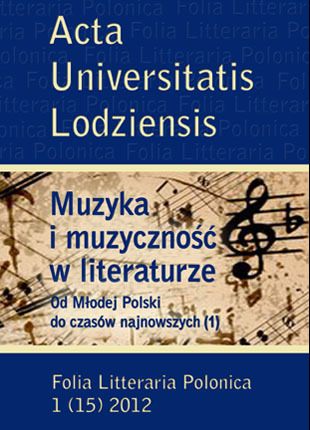Jesienny deszcz — jesienny płacz. Między muzyką a poezją (Verlaine i Staff)
DOI:
https://doi.org/10.18778/1505-9057.15.03Abstrakt
At its beginnings poetry was always connected with music. In Ancient Greece poetry was not only sung, but also danced. Later, the arts separated. However, in Romanticism music became once more a very important notion for poets. Romantics believed that music helped to create the landscape of the human soul. For the same reasons, musicality of poetry fascinated symbolists.
In my article, I am analysing two poems of Paul Verlaine, a French romantic very important also for the Symbolist mouvement, and a master piece of Young Poland’s Symbolism and Impressionism poetry by Leopold Staff. As the poets use a number of proceedings to change their words into music, the three poems are very musical. Taking into consideration that symbolists believed that music was able to transmit emotional meanings, the musical form helped them to prepare their readers to come to a deeper sense.
Not containing any story, all poems are purely lyrical. Each of them evokes autumnal rain which mix with tears, all poetic personae being extremely sad. The musicality lets the readers understand deeper their sadness which reflects also their powerlessness, so famous in the Decadent mouvement. Briefly, thanks to the use of music the poets manage to draw a beautiful picture of a Decadent soul.
Pobrania
Pobrania
Opublikowane
Jak cytować
Numer
Dział
Licencja

Utwór dostępny jest na licencji Creative Commons Uznanie autorstwa – Użycie niekomercyjne – Bez utworów zależnych 4.0 Międzynarodowe.











